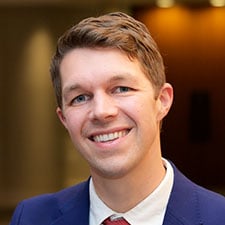William Weber, MD, MPH, saw a problem with the lack of timely and effective care available to patients behind bars, so he decided to do something about it.
The Chicago emergency physician helped found the Medical Justice Alliance, an organization that helps physicians across the nation volunteer as medical expert witnesses working with the attorneys for incarcerated people who are seeking appropriate medical care or compassionate release.
“The U.S. Constitution guarantees that everyone in custody receive appropriate medical care and yet what we'll see is many patients struggling to get that,” said Dr. Weber, referencing the U.S. Supreme Court’s 1976 ruling in Estelle v. Gamble, which said that deliberate indifference to the medical needs of incarcerated people violates their rights under the 8th Amendment.
“Issues like prison staffing can mean that care for diabetes or other conditions falls through the cracks he added.
An assistant professor of emergency medicine at Rush University Medical Center, Dr. Weber said the aim is to help address shortcomings in care without casting blame on the individual physicians and other health professionals trying to provide care in often understaffed prisons and jails. The medical center is part of the Rush University System for Health, which is a member of the AMA Health System Program that provides enterprise solutions to equip leadership, physicians and care teams with resources to help drive the future of medicine.
“What we focus on with the Medical Justice Alliance is looking at systemic issues, and so we're not here to point fingers, we're just saying this person needs better diabetic care,” Dr. Weber said. “It's not this doctor's fault who's working really hard and trying, but the facility itself not being able to provide that care.”
More than 600 cases have been submitted to the group in 45 states, and nearly 500 volunteers in 30 different specialties have helped achieve an 85% success rate, which includes positive outcomes for compassionate release petitions or complaints related to inadequate or inaccessible care.
Patients with terminal illness or permanent disability can qualify for release under compassionate release laws.
Among the incarcerated patients aided by the organization’s physician volunteers is Anthony, a 66-year-old man with terminal cancer and a prognosis of seven months to live whose health was deteriorating behind bars. With the help of testimony from a physician volunteer, a judge granted Anthony release so that he could receive hospice care and be with friends and family.
The American College of Correctional Physicians has a guideline for physicians serving as expert witnesses and policy statements on compassionate release and discharge planning for individuals with complex medical needs.
Dr. Weber is learning how to be a more effective proponent for patient rights as part of the third cohort of a program training physicians to be the next generation of health equity advocacy leaders.
These physicians are participating in the Medical Justice in Advocacy Fellowship, which is a collaborative initiative created by the AMA Center for Health Equity and the Satcher Health Leadership Institute at the Morehouse School of Medicine.
“I've loved the Medical Justice in Advocacy Fellowship, because it provides such tangible skills,” Dr. Weber said. “Through the training and through the support we got there, I was able to write an op-ed to help raise some awareness about issues related to health care while incarcerated.”
Fellows participate in a three-day, in-person learning intensive at the beginning of the fellowship and subsequently engage in monthly learning sessions with a multidisciplinary group of nationally renowned experts, scholars, researchers and current and former policymakers across all levels of government.
“I was really impressed by the AMA providing this fellowship to help equip leaders in the area of social medicine,” Dr. Weber said. “What I loved about this was—for people who have already shown interest in social medicine and maybe started out on a project—this program really helps equip you to get to the next level.”
The fellowship is just one of the ways the AMA is working to advance health equity.
The AMA Center for Health Equity works to embed health equity across the AMA organization so that health equity becomes part of the practice, process, action, innovation and organizational performance and outcomes. Explore further with the AMA’s 2024–2025 strategic plan to advance health equity.
Watching and learning
Dr. Weber also recently attended the AMA National Advocacy Conference in Washington with other members of the Medical Justice in Advocacy Fellowship.
“We're getting chances to speak with congressmen, with senators, and practice those skills, and learning how to approach someone who is in a position to change policy—and how to explain the concerns you have and help them to make better decisions?” he said. “That's not training we get in medical school.”
Watching longtime AMA advocates has been educational.
“With the American Medical Association, there are so many people who have this expertise, who've done it before, and so the fellowship has allowed me to sit in and see how they do it,” Dr. Weber said. “How do you pitch something to a congressperson in a way that they will understand and a way that will potentially make a change?”
Seeing impact of unmet social needs
Dr. Weber’s original interest was in global emergency medicine, and—in 2019—he landed a fellowship training position in that subspecialty. But as was the case for so many other people at the time, he had to change his plans.
“Many countries don't have emergency medicine as an established specialty, so I was going to help train them, and then also do disaster relief,” Dr. Weber recalled.
“2020 rolled around and, because of COVID-19, suddenly I could not go abroad—we weren’t even allowed to leave the state,” he added. “So I pivoted to supporting domestic health equity more and social medicine.”
While he was deeply disappointed at the time, the result has been positive.
“I feel very lucky, because this opened a new opportunity,” Dr. Weber said, explaining that he believes physicians pushing for better health care in prisons and jails are able to have an outsized impact.
And in his everyday practice of emergency medicine, Dr. Weber gets to see how a lack of access to health care affects society as a whole.
“The thing I love about emergency medicine is that we are the one place where we will never turn a patient away,” Dr. Weber said.
“We are going to provide for you as a patient no matter what your immigration status, no matter your insurance status, no matter where you're coming from,” he added. “We are going to provide for you and support you.”
His kind of town
After completing medical school and residency training in Chicago, Dr. Weber decided to stay in Chicago to practice at Rush.
“I really appreciated Rush's community involvement,” said Dr. Weber.
“They are very focused on supporting the community around them and really caring about social determinants of health,” he added. “They have almost weekly meetings about—how can we better support our patients with their social needs?”
The impact of unmet social needs, such as a lack of stable housing, becomes apparent in the emergency department.
“Patients are on the streets and their feet get cold, then they get gangrene, or they're getting frostbite,” Dr. Weber said. “By addressing some of the social determinants of health such as housing, they can have much better outcomes.”
Read AMA policies on care for incarcerated patients:





